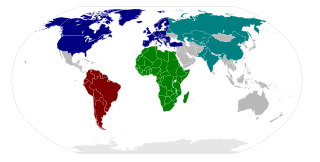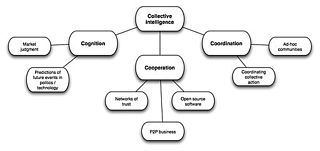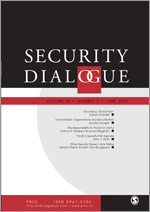Information security, sometimes shortened to infosec, is the practice of protecting information by mitigating information risks. It is part of information risk management. It typically involves preventing or at least reducing the probability of unauthorized/inappropriate access, use, disclosure, disruption, deletion/destruction, corruption, modification, inspection, recording or devaluation, although it may also involve reducing the adverse impacts of incidents. Information may take any form, e.g. electronic or physical., tangible or intangible. Information security's primary focus is the balanced protection of the confidentiality, integrity and availability of data while maintaining a focus on efficient policy implementation, all without hampering organization productivity. This is largely achieved through a structured risk management process that involves:
Political science is a social science which deals with systems of governance, and the analysis of political activities, political thoughts, and political behavior.

David Émile Durkheim was a French sociologist. He formally established the academic discipline of sociology and—with W. E. B. Du Bois, Karl Marx and Max Weber—is commonly cited as the principal architect of modern social science.

The documentary hypothesis (DH) is one of the models historically used by biblical scholars to explain the origins and composition of the Torah. More recent models include the supplementary hypothesis and the fragmentary hypothesis. All agree that the Torah is not a unified work from a single author, but is made up of sources combined over many centuries by many hands. These models differ on the nature of these sources and how they were combined.

An organization or organisation is an entity comprising multiple people, such as an institution or an association, that has a particular purpose.

Comics is a medium used to express ideas through images, often combined with text or other visual information. Frequently, comics takes the form of sequences of panels of images. Often textual devices such as speech balloons, captions, and onomatopoeia indicate dialogue, narration, sound effects, or other information. The size and arrangement of panels contribute to narrative pacing. Cartooning and similar forms of illustration are the most common image-making means in comics; fumetti is a form which uses photographic images. Common forms include comic strips, editorial and gag cartoons, and comic books. Since the late 20th century, bound volumes such as graphic novels, comic albums, and tankōbon have become increasingly common, while online webcomics have proliferated in the 21st century with the advent of the Internet.
The Glass–Steagall legislation describes four provisions of the United States Banking Act of 1933 separating commercial and investment banking. The article 1933 Banking Act describes the entire law, including the legislative history of the provisions covered here.
International relations theory is the study of international relations (IR) from a theoretical perspective. It attempts to provide a conceptual framework upon which international relations can be analyzed. Ole Holsti describes international relations theories as acting like pairs of coloured sunglasses that allow the wearer to see only salient events relevant to the theory; e.g., an adherent of realism may completely disregard an event that a constructivist might pounce upon as crucial, and vice versa. The three most prominent theories are realism, liberalism and constructivism. Sometimes, institutionalism proposed and developed by Keohane and Nye is discussed as a paradigm differed from liberalism.

A great power is a sovereign state that is recognized as having the ability and expertise to exert its influence on a global scale. Great powers characteristically possess military and economic strength, as well as diplomatic and soft power influence, which may cause middle or small powers to consider the great powers' opinions before taking actions of their own. International relations theorists have posited that great power status can be characterized into power capabilities, spatial aspects, and status dimensions.

Collective security can be understood as a security arrangement, political, regional, or global, in which each state in the system accepts that the security of one is the concern of all, and therefore commits to a collective response to threats to, and breaches to peace. Collective security is more ambitious than systems of alliance security or collective defense in that it seeks to encompass the totality of states within a region or indeed globally, and to address a wide range of possible threats. While collective security is an idea with a long history, its implementation in practice has proved problematic. Several prerequisites have to be met for it to have a chance of working. It is the theory or practice of states pledging to defend one another in order to deter aggression or to exterminate transgressor if international order has been breached.

Participatory action research (PAR) is an approach to research in communities that emphasizes participation and action. It seeks to understand the world by trying to change it, collaboratively and following reflection. PAR emphasizes collective inquiry and experimentation grounded in experience and social history. Within a PAR process, "communities of inquiry and action evolve and address questions and issues that are significant for those who participate as co-researchers". PAR contrasts with many research methods, which emphasize disinterested researchers and reproducibility of findings.
Critical international relations theory is a diverse set of schools of thought in international relations (IR) that have criticized the theoretical, meta-theoretical and/or political status quo, both in IR theory and in international politics more broadly – from positivist as well as postpositivist positions. Positivist critiques include Marxist and neo-Marxist approaches and certain ("conventional") strands of social constructivism. Postpositivist critiques include poststructuralist, postcolonial, "critical" constructivist, critical theory, neo-Gramscian, most feminist, and some English School approaches, as well as non-Weberian historical sociology, "international political sociology", "critical geopolitics", and the so-called "new materialism". All of these latter approaches differ from both realism and liberalism in their epistemological and ontological premises.
Christopher W. Johnson, FBCS FRSE, is a British computer scientist and Professor at the University of Glasgow, UK. He has been Head of Computing in Glasgow since June 2014.

Collective intelligence (CI) is shared or group intelligence that emerges from the collaboration, collective efforts, and competition of many individuals and appears in consensus decision making. The term appears in sociobiology, political science and in context of mass peer review and crowdsourcing applications. It may involve consensus, social capital and formalisms such as voting systems, social media and other means of quantifying mass activity. Collective IQ is a measure of collective intelligence, although it is often used interchangeably with the term collective intelligence. Collective intelligence has also been attributed to bacteria and animals.
Kristo Ivanov is a Swedish-Brazilian information scientist and systems scientist of ethnic Bulgarian origin. He is professor emeritus at the Department of informatics of Umeå University in Sweden.

Security Dialogue is a peer-reviewed academic journal that publishes scholarly articles which combine contemporary theoretical analysis with challenges to public policy across a wide-ranging field of security studies. The journal is owned by the Peace Research Institute Oslo which also hosts the editorial office. As of 1 October 2015 Mark B. Salter is the editor-in-chief. Marit Moe-Pryce has been the Managing Editor of the journal since 2004. Current Associate Editors are Marieke de Goede, Emily Gilbert, Jairus V. Grove, Jana Hönke, Doerthe Rosenow Anna Stavrianakis, and Maria Stern.

Peter Lehmann is an author, social scientist, publisher, provider of a mail-order book-service and an independent freelance activist in humanistic anti-psychiatry, living in Berlin, Germany.
In philosophy and sociology, culturalism is the central importance of culture as an organizing force in human affairs. It was originally coined by the Polish-American philosopher and sociologist Florian Znaniecki in his book Cultural Reality (1919) in English and later translated into Polish as kulturalizm. Znaniecki had introduced a similar concept in earlier Polish language publications which he described as humanism (humanizm).
Autonomous social centers are self-organized community centers in which anti-authoritarians put on voluntary activities. These self-managed spaces, often in multi-purpose venues affiliated with anarchism, can include bicycle workshops, infoshops, libraries, free schools, free shops, meeting spaces and concert venues. They often become political actors in their own right.
Anti-corruption (anticorruption) comprise activities that oppose or inhibit corruption. Just as corruption takes many forms, anti-corruption efforts vary in scope and in strategy. A general distinction between preventive and reactive measures is sometimes drawn. In such framework, investigative authorities and their attempts to unveil corrupt practices would be considered reactive, while education on the negative impact of corruption, or firm-internal compliance programs are classified as the former.









